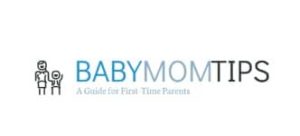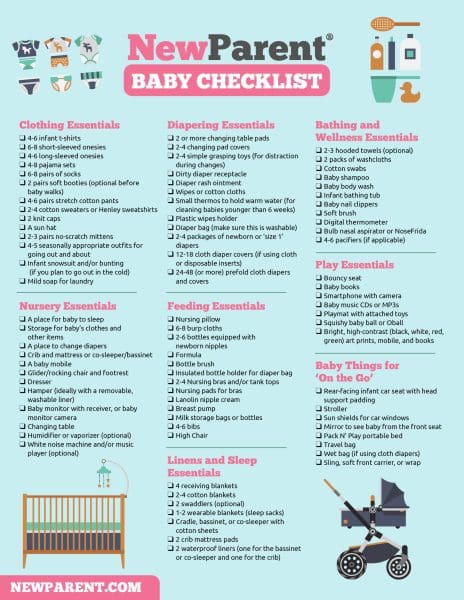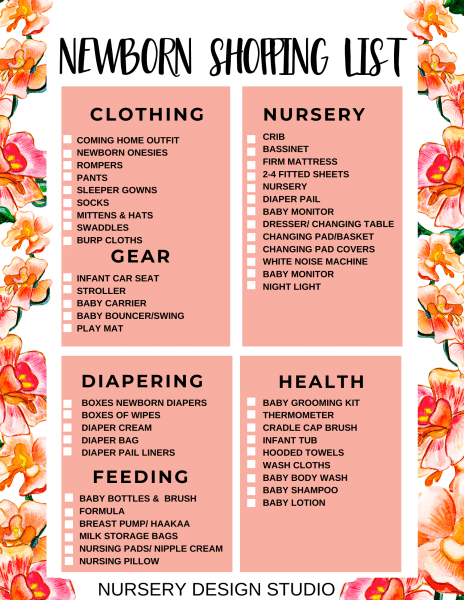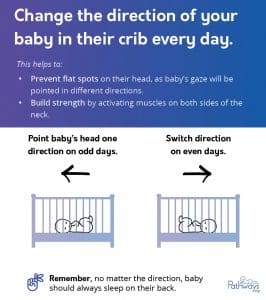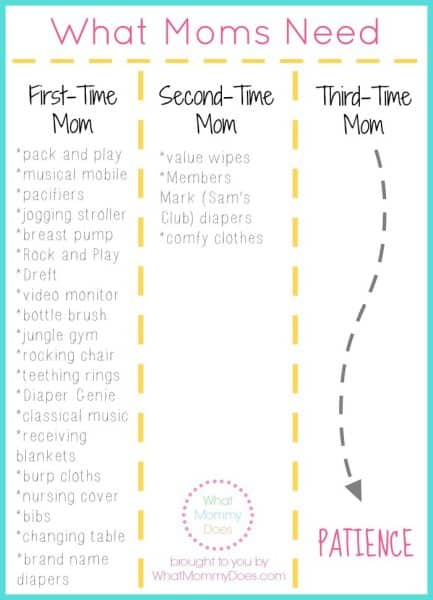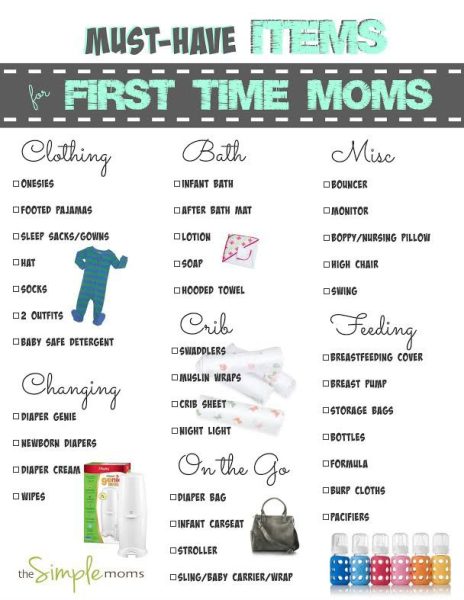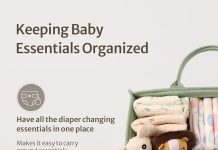Congratulations on entering the wonderful world of parenthood! As first-time parents, you may be overwhelmed with the endless array of baby products and advice flooding your way.
With so many options, it can be challenging to determine what is truly essential for your little one’s arrival.
In this article, you will discover the essential items that first-time parents need most, helping you navigate this exciting new chapter quickly and confidently.
Review contents
1. Baby Essentials
1.1 Clothing
Regarding clothing for your newborn, comfort and practicality are key. Look for soft, breathable fabrics like cotton that won’t irritate your baby’s sensitive skin. Opt for clothing with snap or zip closures for easy diaper changes, and consider investing in a few items with built-in mittens to protect your little one from scratching themselves. It’s also a good idea to have a range of sizes on hand, as babies tend to grow quickly in their first year.
1.2 Diapers
Diapers are an essential item when it comes to caring for your baby. Whether you choose disposable or cloth diapers, ensure you have an ample supply before your little one arrives. Disposable diapers are convenient, while cloth diapers can be more cost-effective and environmentally friendly. Whichever option you choose, remember that newborns can go through as many as 10 to 12 diapers a day, so it’s essential to stock up accordingly.
1.3 Feeding Supplies
Feeding your baby is another essential aspect of caring for them. If you plan to breastfeed, a comfortable nursing bra and breastfeeding pillow can make the experience much more enjoyable. For bottle-feeding, ensure you have an adequate supply of bottles, nipples, and a brush for easy cleaning. Having some burp cloths or muslin squares on hand is also a good idea to protect your clothes from spit-ups.
1.4 Baby Care Products
To keep your baby clean and comfortable, you’ll need a few baby care products. This includes gentle baby shampoo and body wash, moisturizing lotion, diaper rash cream, and wipes. Look for products specifically formulated for newborns and free from harsh chemicals. It’s also important to have a soft baby brush or comb for grooming their delicate hair.
1.5 Nursery Items
Creating a cozy and safe nursery for your baby is important for their overall well-being. Essential nursery items include a crib or bassinet, a firm mattress with a fitted sheet, a baby monitor for peace of mind, and a changing table or pad for easy diaper changes. You may also want to consider a rocking chair or glider for those late-night feedings and a baby mobile or soft toys to stimulate your little one’s senses.
2. Parenting Books and Resources
2.1 Books on Pregnancy and Childbirth
Educate yourself and gain confidence in your journey through pregnancy and childbirth by reading books specifically designed for first-time parents. These books cover a wide range of topics, from understanding the changes in your body during pregnancy to preparing for labor and delivery. Look for books that provide evidence-based information, practical advice, and real-life stories from experienced parents.
2.2 Parenting Guides
Once your baby arrives, parenting guides can be an invaluable resource to navigate the early years of your child’s life. From sleep training to feeding schedules, these guides offer practical tips and techniques to help you establish routines and address common challenges. Consider books that align with your parenting style and philosophy and cover various topics, including infant development, discipline strategies, and building a strong parent-child bond.
2.3 Online Websites and Blogs
In addition to books, online websites, and blogs can provide a wealth of information and support for first-time parents. Online parenting communities allow you to connect with other parents, share experiences, and seek advice. Find reputable websites and blogs offering evidence-based information, expert opinions, and practical tips. It’s important to remember that while these resources can be helpful, every child is unique, and it’s essential to trust your instincts as a parent.
3. Child Safety Products
3.1 Baby Monitor
Keeping your baby safe and secure is a top priority for any parent. A baby monitor allows you to keep an eye and ear on your little one, even when you’re not in the same room. Look for monitors with video capabilities, night vision, and two-way audio communication to see and hear your baby. Some monitors also offer additional features like room temperature monitoring and lullabies.
3.2 Childproofing Items
As your baby starts to explore their surroundings, it’s important to ensure a safe environment by childproofing your home. This includes installing safety gates at the top and bottom of stairs, securing furniture to the wall to prevent tipping, covering electrical outlets, and putting childproof locks on cabinets and drawers. You may also consider removing choking hazards or breakable items from your baby’s reach.
3.3 Car Seat
A car seat is essential for transporting your baby safely in a vehicle. Make sure you choose a car seat that is appropriate for your baby’s age and weight and meets current safety standards. It’s recommended to have a rear-facing car seat for infants and young children, as this provides the best protection in the event of a collision. Always follow the manufacturer’s instructions for proper installation and use.
4. Supportive Community
4.1 Joining Parenting Groups
Connecting with other parents who are going through similar experiences can provide a valuable support system. Joining parenting groups, whether in person or online, allows you to share stories, ask questions, and seek advice from those who have been through it all before. Look for local parenting groups, mommy and me classes, or online forums where you can meet new parents and build lasting friendships.
4.2 Attending Parenting Classes
Parenting classes offer valuable guidance and skills to help you navigate the challenges of raising a child. From infant CPR to newborn care, these classes cover various topics and provide hands-on training. Attending these classes equips you with practical knowledge and allows you to connect with other parents in a supportive environment.
4.3 Seeking Professional Advice
In addition to peer support, seeking professional advice can be beneficial, especially when faced with specific challenges or concerns. Pediatricians, lactation consultants, and therapists specializing in infant and child development can provide expert guidance tailored to your child’s unique needs. Don’t hesitate to reach out and ask for help if you feel overwhelmed or unsure about any aspect of parenting.
5. Adequate Sleep
5.1 Establishing a Bedtime Routine
A consistent bedtime routine helps signal your baby that it’s time to wind down and prepare for sleep. Establishing a soothing routine can include a warm bath, gentle massage, calming music, and reading a bedtime story. By following the same routine each night, your baby will associate these activities with sleep and find comfort in the predictability.
5.2 Creating a Sleep-Friendly Environment
Creating a sleep-friendly environment is crucial for your baby’s restful sleep. Keep the room temperature comfortable and ensure the lighting is dim during nighttime sleep. Consider using blackout curtains or shades to block out external light. Use white noise machines or soft lullabies to drown out any background noises that may disrupt your baby’s sleep. Also, ensure your baby’s crib or bassinet is a safe sleep space with a firm mattress, fitted sheet, and no loose bedding or soft toys.
5.3 Taking Naps when the Baby Sleeps
Naptime is important for your baby’s growth and development and your well-being as a parent. As much as possible, take advantage of your baby’s nap times to rest, recharge, or accomplish tasks that require your attention. Remember, you don’t need to do everything while your baby sleeps. Prioritize self-care and choose activities that help you relax and rejuvenate, whether taking a nap, reading a book, or simply enjoying a cup of tea.
6. Emotional Support
6.1 Partner’s Help and Understanding
Your partner’s support and understanding are crucial during this exciting yet challenging time. Share the responsibilities of caring for your baby and communicate your feelings, concerns, and needs openly. Lean on each other for emotional support and remind yourselves that you’re both navigating this journey together.
6.2 Supportive Family and Friends
The support of family and friends can also make a significant difference in your journey as a first-time parent. Whether it’s offering a helping hand with chores, providing a listening ear, or simply being there to celebrate milestones and little victories, the support of loved ones can help ease the transition into parenthood.
6.3 Seeking Counseling if Needed
Sometimes, the challenges of parenthood can become overwhelming, and seeking professional counseling or therapy can be immensely beneficial. A mental health professional can provide guidance, support, and strategies for coping with stress, anxiety, or any other emotional difficulties you may be experiencing. Remember, seeking help is a sign of strength, and it’s important to prioritize your mental well-being as you care for your baby.
7. Time Management Skills
7.1 Prioritizing Tasks
Managing your time effectively as a new parent can be a juggling act. Identify the most important tasks and prioritize accordingly. Focus on the essential tasks that directly impact your baby’s well-being, such as feeding, diaper changes, and sleep routines. Anything non-essential can be saved for later or delegated to others.
7.2 Setting Realistic Expectations
It’s important to set realistic expectations for yourself as a new parent. Understand that there will be ups and downs, and not every day will go according to plan. Give yourself grace and embrace the unpredictability of parenthood. It’s okay if your to-do list is not completed or if you need to adjust your expectations to accommodate your baby’s needs.
7.3 Accepting Help and Delegating
Asking for and accepting help is not a sign of weakness but a recognition that parenthood is a team effort. Don’t be afraid to lean on your partner, family, and friends for support. Delegate tasks, whether household chores, meal preparation, or running errands, and allow others to lend a helping hand. This will free up valuable time and energy for you to focus on bonding with your baby and taking care of yourself.
8. Self-Care and Well-being
8.1 Taking Breaks for Personal Time
Taking breaks for personal time is essential for mental and emotional well-being. Set aside dedicated time each day or week to engage in activities that bring you joy and relaxation. Whether going for a walk, practicing yoga, reading a book, or enjoying a hobby, prioritize self-care and make time for activities that recharge and rejuvenate you.
8.2 Maintaining a Healthy Lifestyle
Maintaining a healthy lifestyle is not only beneficial for you but also sets a positive example for your child. Prioritize nutritious meals, regular exercise, and adequate sleep to ensure your well-being. Aim to incorporate healthy habits into your daily routine, such as preparing nourishing meals, staying hydrated, and engaging in physical activity. Remember, caring for yourself is as important as caring for your baby.
8.3 Asking for Help to Avoid Burnout
Parenting can be demanding, and it’s important to recognize when you need support to avoid burnout. Don’t hesitate to ask for help when you need it. Reach out to family, friends, or a support network for assistance with childcare or household tasks. Consider hiring a babysitter or nanny for occasional breaks. Remember, taking care of yourself enables you to be your best parent.
9. Financial Planning
9.1 Creating a Budget for Baby Expenses
Preparing for the financial responsibilities of parenthood is an essential part of planning for a baby. Start by creating a budget for the extra costs associated with a baby, including diapers, formula or breastfeeding supplies, baby gear, and healthcare expenses. Factor in additional expenses such as childcare or education savings, and adjust your budget accordingly.
9.2 Establishing an Emergency Fund
Building an emergency fund is crucial for dealing with unexpected expenses as a new parent. Aim to save three to six months’ worth of living expenses in a separate account to provide a safety net in case of job loss, medical emergencies, or unforeseen circumstances. An emergency fund can provide your growing family peace of mind and financial security.
9.3 Reviewing Insurance Coverage
Reviewing your insurance coverage is important in ensuring your family’s financial well-being. Consider updating your health insurance policy to include coverage for your baby and explore life insurance options to provide financial protection in the event of your or your partner’s passing. Review other insurance policies, such as homeowners’ or renters’ insurance, to ensure they adequately protect your growing family.
10. Patience and Flexibility
10.1 Adapting to Changes
Parenthood is a journey filled with constant change, and learning to adapt is crucial for your well-being. Embrace the changes that come with raising a baby, whether adjusting your routines, re-evaluating your priorities, or finding new ways to navigate challenges. Remember, every stage of your baby’s development will bring new joys and learning opportunities.
10.2 Being Patient with Baby’s Development
Each baby develops at their own pace, and it’s important to be patient and understanding. Avoid comparing your baby’s progress to others and celebrate their milestones. Create a nurturing and supportive environment that encourages your baby’s growth and development, and remember that every baby is unique.
10.3 Finding a Balance
Finding a balance between parent, partner, and individual roles is key to maintaining overall well-being. Prioritize quality time with your baby and partner, but also make time for yourself and other important relationships. Strive for balance by setting boundaries, practicing self-care, and seeking support when needed. Remember, finding a balance is a continuous journey, and adjusting and adapting along the way is okay.
As a first-time parent, it’s natural to feel overwhelmed and unsure of what you need most. By focusing on the essentials, seeking support from your community, and prioritizing your well-being, you can confidently navigate the joys and challenges of parenthood. Remember, you are not alone in this journey; resources and support are available to help you every step of the way. Enjoy the precious moments with your little one and embrace the incredible experience of becoming a parent.
